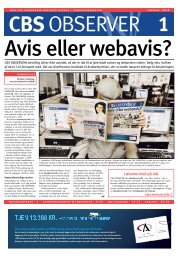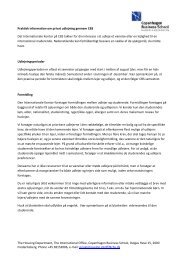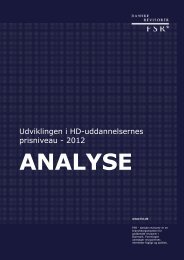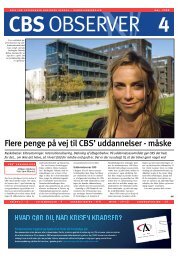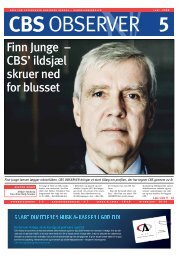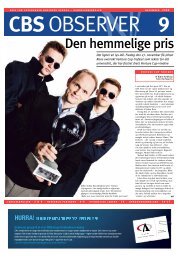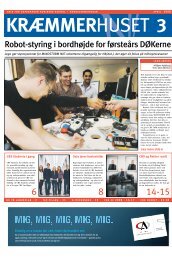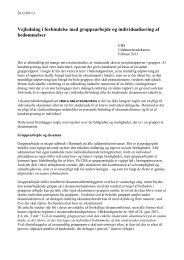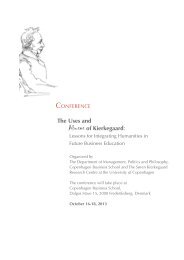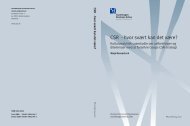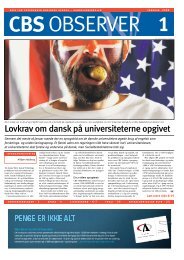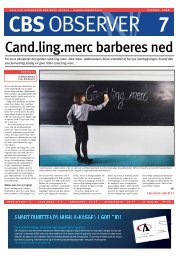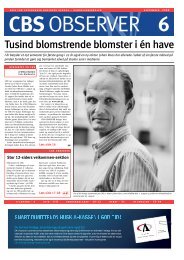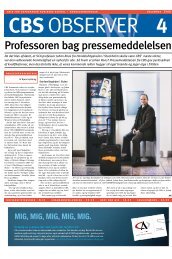Ønskes: højtuddannede (danske!) iværksættere - CBS Observer
Ønskes: højtuddannede (danske!) iværksættere - CBS Observer
Ønskes: højtuddannede (danske!) iværksættere - CBS Observer
You also want an ePaper? Increase the reach of your titles
YUMPU automatically turns print PDFs into web optimized ePapers that Google loves.
22<br />
eSangathan is an EU funded project<br />
dealing with the fundamental<br />
problem of the ageing knowledge<br />
worker. As European citizens keep<br />
getting older, the most likely solution<br />
would be that people will have<br />
to work longer. The inadequacy of<br />
most European nations to deal with<br />
this impasse has encouraged the<br />
EU to push this issue higher up on<br />
the agenda, allowing all kinds of<br />
alliances to focus and be funded.<br />
The focus of eSangathan lies<br />
firmly on knowledge sharing, aiming<br />
to tackle this problem through<br />
Information and Communications<br />
Technology (ICT), but including<br />
an intercultural perspective. This<br />
consists of an alliance with India,<br />
where working longer is already a<br />
common practice, and a large proportion<br />
of the retired knowledge<br />
workers continue to work for their<br />
former employers as experts.<br />
However, a lack of ICT tools<br />
makes these Indian senior expert’s<br />
lives more complicated than necessary.<br />
eSangathan wishes to experiment<br />
on how they could benefit<br />
from using collaborative ICT tools,<br />
and this is where two major stakeholders<br />
– <strong>CBS</strong>’ Centre for Applied<br />
Information and Communications<br />
Technology (CAICT) and<br />
Indian multi billion corporation<br />
Mahindra&Mahindra – have stepped<br />
in to run the pilot project.<br />
A tale of two pilots<br />
The project is titled “Collaborative<br />
Working Environments and Social<br />
Innovations for Seniors” and holds<br />
two pilot projects. One pilot is<br />
running in the Öresund region of<br />
Sweden and Denmark, testing the<br />
Indian social model, which using<br />
European technological capabilities<br />
should enable more European 50+<br />
knowledge workers to re-enter the<br />
labor market.<br />
The other pilot is running in India<br />
in one of the country’s major corporations,<br />
testing how the implementation<br />
of a Collaborative Working<br />
Environment could facilitate and<br />
increase efficiency in the work and<br />
life of expert retirees. The Mahindra<br />
& Mahindra Corporation, as a member<br />
of the consortium, is hosting<br />
and managing this pilot project with<br />
the technical support of its subsidiary<br />
Tech Mahindra.<br />
Social ICT innovation<br />
The project consequently is a two<br />
way street in terms of a shared<br />
interest, as project alliances usually<br />
are, catering to both European<br />
interest in the Indian social models<br />
and Indian interest in the European<br />
ICT methodologies.<br />
Associate Professor Leif Bloch<br />
in-house newspaper for copenhagen business school<br />
Of long term thinking and broad horizons<br />
In a buzzword riddled business world of stakeholder networks, knowledge sharing and collaborative working<br />
environments, <strong>CBS</strong> professors are doing their best to keep up. <strong>CBS</strong>’ involvement in the eSangathan project includes<br />
all of the above – with an Indian social twist<br />
Proving that there's life in the old dogs yet - something that Indian businesses rely on, <strong>CBS</strong> Associate professor Leif Bloch Rasmussen's eSangathan project<br />
facilitates a best practice knowledge sharing, providing ICT-support for Indian grey knowledge and learning how to keep the very seniors working here.<br />
non-retirement<br />
By Lidewei Mulders<br />
Photo: Liselotte Østergaard<br />
Rasmussen, who is in charge at the<br />
CAICT-end of the project, explains:<br />
- In the EU, the workforce is<br />
ageing, and knowledge is lost as<br />
seniors move out of the organization.<br />
In India they hold on to their<br />
retired employees, acknowledging<br />
the need for their knowledge, and<br />
also need to develop better tools<br />
to facilitate this. This project looks<br />
at how ICT can be used to create<br />
more flexible working methods,<br />
in order to increase knowledge<br />
sharing and enable people to stay<br />
involved in organizations for longer.<br />
This gives the project its social connection<br />
in the EU and its informational<br />
connection in India.<br />
The alliance between<br />
Mahindra&Mahindra and Leif Bloch<br />
Rasmussen was also struck through<br />
the company’s curiosity about<br />
European ways of thinking.<br />
- As Mahindra&Mahindra has<br />
plans to make a strategic move<br />
into Europe through acquisitions,<br />
they are particularly interested in<br />
European models of decision making.<br />
The company’s interest in this<br />
project is also that they will learn<br />
more about the European way of<br />
doing business. They recognize the<br />
fact that doing business is quite different<br />
in Europe, and they hope to<br />
learn ways of establishing networks<br />
in the European way, Leif Bloch<br />
Rasmussen elaborates.<br />
Mahindra&Mahindra is part of<br />
the Mahindra Group, a multi billion<br />
Indian consortium of over 400,000<br />
employees in the business sectors<br />
of automotive, ICT and financial services.<br />
As they are in the process of<br />
expanding into Europe, they seek to<br />
acquire companies that will complement<br />
and enlarge them in the consortium’s<br />
automotive and farming<br />
equipment business area, and are<br />
trying to make deals quickly.<br />
- It is a huge<br />
company, and<br />
they have a lot<br />
of money to<br />
spend, so they<br />
are looking to<br />
make a fast<br />
move, hoping<br />
the methodology<br />
used in<br />
the project<br />
will help them<br />
along the way,<br />
says Leif Bloch<br />
Rasmussen.<br />
Scandinavian methodology<br />
The methodology developed<br />
by <strong>CBS</strong> and Folkuniversitetet in<br />
Landskrona (the Swedish Partner<br />
in the project) and used in the<br />
project is called the “Kundskabende<br />
Systemer”, and it is primarily used<br />
to create social innovation:<br />
- It is made up out of eight tools<br />
to create a collaborative working<br />
environment and should help<br />
to make sense of the world. It is<br />
based on the philosophical prac-<br />
‘I think it would be good<br />
for <strong>CBS</strong> as an institution to<br />
value a broader range of<br />
influences than just those<br />
of Michael Porter and BCG.<br />
The school could be so much<br />
more innovative if it stuck<br />
less to the beaten path.<br />
Leif Bloch Rasmussen<br />
Associate professor<br />
tice of open dialogue, meaning<br />
that being open minded will create<br />
new ways of thinking and therefore<br />
more innovation. One of the<br />
theorists, we use, is David Snowdon<br />
(former head of IBM Knowledge<br />
Management; now head of the<br />
Cynefin Centre in Wales), as well<br />
as Manuel Castells on the networking<br />
society, Leif Bloch Rasmussen<br />
explains and points out that in<br />
this project, sense making takes an<br />
important role by establishing an<br />
open inquiry from the start.<br />
- This is followed by the relation<br />
making, where teams define<br />
their own themes with 30 people<br />
sitting in India and 30 people in<br />
the Öresund region. The message<br />
of the project is to try and look<br />
for other cultural ways of doing<br />
business and being open minded,<br />
which is beneficial to innovation.<br />
Because when people try to hide<br />
their knowledge and try to register<br />
and trademark their ideas, they<br />
stop the flow of information and<br />
thereby stop the advancement of<br />
knowledge, Leif Bloch Rasmussen<br />
continues and emphasizes:<br />
- In the quest of solving the<br />
problems of the ageing society, it<br />
seems that nations need every help<br />
they can get.<br />
Sustainable innovation<br />
Rasmussen’s methodology aims<br />
to combine the ICT and the social<br />
development in an optimum way.<br />
The result of the project will be a<br />
white paper that should stipulate<br />
advice for the EU on making policy<br />
decisions on how to use ICT for<br />
seniors to enhance their functionality<br />
and knowledge transfer in the<br />
workplace – with the added value<br />
of having examined how seniors<br />
function in the workplace in different<br />
cultural settings.<br />
The lessons learned from this<br />
project and the Indian involvement,<br />
where competing<br />
on sustainability<br />
and long term<br />
thinking is a bigger<br />
factor than<br />
in the Western<br />
world. We can<br />
and should cooperate<br />
more on<br />
innovation from<br />
the Bottom of<br />
the Pyramid as<br />
expressed by C.K.<br />
Prahalad – the<br />
four billion poor<br />
people, as Leif Bloch Rasmussen is<br />
quite happy to conclude:<br />
- I think it would be good for<br />
<strong>CBS</strong> as an institution to value a<br />
broader range of influences than<br />
just those of Milton Friedman,<br />
Michael Porter and BCG. The<br />
school could be so much more<br />
innovative if it stuck less to the<br />
beaten path.<br />
1



